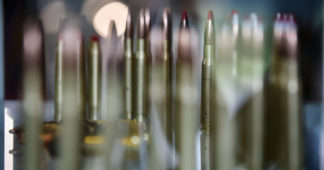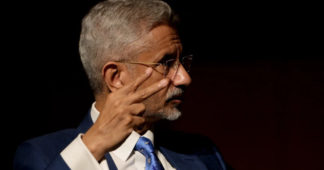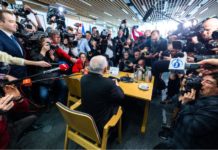by Ana Vračar
May 22, 2025
Following Parliament’s motion for an arms embargo on Israel, activists are pressuring the Sánchez government to turn words into action on Gaza genocide
On Tuesday, May 20, a majority of representatives in the Spanish Parliament voted in favor of a motion calling for an arms embargo on Israel. Spearheaded by the progressive blocs Podemos, Sumar, and the Republican Left of Catalonia, everyone but the right-wing supported the motion – including Prime Minister Pedro Sánchez’s Socialist Workers’ Party (PSOE).
While the news undoubtedly marks an important achievement for the months-long grassroots Palestine solidarity mobilizations in Europe and beyond, many activists caution against interpreting it as a decisive sign of Spain’s concrete commitment to halting the genocide in Gaza. “The Spanish government has the power to introduce a full arms embargo on Israel as early as tomorrow via Royal Decree,” warned the End Arms Trade with Israel campaign, which has rallied behind this demand since 2024 with the backing of over 600 organizations. “Why hasn’t it acted? What’s holding it back?”
Business as usual beneath the surface?
Since October 7, 2023, Sánchez and his cabinet have made several statements clearly more critical of Israel than those of most other European governments. In contrast to declarations by high-level European officials like Ursula von der Leyen and Kaja Kallas, who continue to invoke “Israel’s right to self-defense” even as it starves tens of thousands of children and obliterates healthcare infrastructure, Spain’s rhetoric has, at times, sounded outright progressive. The Prime Minister recently suggested expelling Israel from the Eurovision contest – a topic surprisingly dear to many Europeans – and his administration claimed to have ceased trading in military goods with the occupation power in late 2023. However, this claim has been refuted by multiple reports and port calls by ships transporting military or dual-use goods to Israel.
Further doubt has been cast on the government’s narrative by the Ministry of Defense, whose representatives recently said that implementing a full embargo would be “difficult in practice” due to the importance of Israeli technology in cybersecurity and artificial intelligence. These sources have essentially admitted that they view the arms embargo debate as more politically symbolic than practically feasible.
Contrary to the government’s progressive image and declarations, “Spain has never imported more [from Israel] than after October 7, 2023,” the Delàs Center for Peace Studies warned in a recent report. “Since October 7, Israeli defense and security companies, their subsidiaries, or third-party companies linked to Israeli products have been awarded at least 46 contracts by Spanish institutions, with a total value more than €1.044 million.”
While Palestine solidarity groups identified some of these contracts and pushed against them, the scale of trade between Spain and Israel throughout the genocide has remained significant, according to updates from Delàs Center. Even now, as the parliamentary debate on introducing an arms embargo moves forward, warnings continue about ships carrying ammunition and other potentially military-use equipment bound for Israel via Spanish ports. One such vessel, the Danica Violet, is expected to pass through Cartagena in the coming days.
“Contracts with the Israeli arms industry remain in force and have yet to be canceled. Weapons stained with blood continue to pass through our ports and airports. We continue to finance and facilitate genocide, occupation, and apartheid in Palestine,” wrote the End Arms Trade with Israel campaign.
Palestine solidarity movement to push for more than tokenism
The campaign and its supporters have reiterated calls for the government to act urgently and decisively by imposing a full arms embargo immediately. Similar demands have been voiced in neighboring countries, where political leaders have recently signaled minor shifts in their approach to Israel. Following announcements by British, Canadian, and French leaders that they would consider introducing sanctions on Israel if it failed to halt illegal settlement expansion in the West Bank, Palestine solidarity groups warned that such measures would be nowhere near sufficient. “While these statements may reflect a symbolic political shift, they are far too late and fall dangerously short of meeting these states’ legal obligations under international law, including the Genocide Convention and the Apartheid Convention,” said the Palestinian BDS National Committee (BNC).
“We will continue to organize and build people power to transform tokenism and empty threats into tangible and effective accountability measures, starting with a two-way military embargo and full-scale trade and diplomatic sanctions,” the BNC stated.
We remind our readers that publication of articles on our site does not mean that we agree with what is written. Our policy is to publish anything which we consider of interest, so as to assist our readers in forming their opinions. Sometimes we even publish articles with which we totally disagree, since we believe it is important for our readers to be informed on as wide a spectrum of views as possible.











